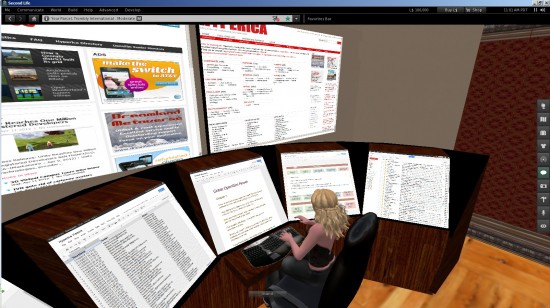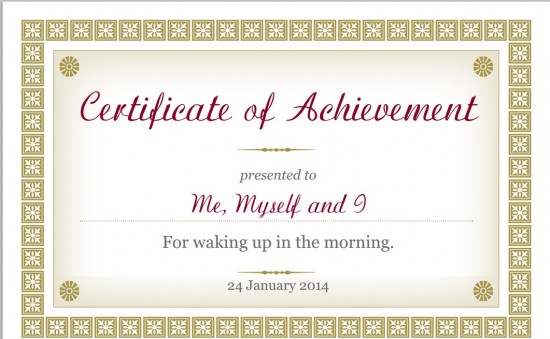I am my own boss, and probably many of you are, as well. And even if you aren’t doing this virtual world stuff full-time yet, you might be planning to, or running a grid, consulting company, or virtual products store as a side business.
And you know how hard it can be. The marketing, the economy, the tech support, the way the technology lets you down all the time — or moves ahead so fast you can barely keep up. The lack of support from family and friends. The low pay.
It almost makes you want to throw up your hands and give up.
Now imagine that your business was just a job, and on top of all the problems and responsibilities you had to deal with, you also had a lousy boss. A boss that constantly criticized you and never thanked you for doing anything. Made you work long hours. Made you do tasks you hated more than anything else in the world, instead of assigning them to someone else. A boss who was always reacting to situations and coming to you with emergencies, instead of planning ahead.
I don’t know about you, but I actually have that person as a boss. And it’s me. And it’s doesn’t stop there.
You know that boss who lets employees hang around the water cooler all day gossiping when there’s work to be done? So then everyone has to stay late or work through the weekend to make deadlines? That’s me.
The boss who spends an  inordinate amount of time obsessing over picky details that don’t matter to anyone, and misses the big stuff? That’s me.
The boss who lets sales and marketing slide while there’s work, and then panics when projects end because there are no new customers lined up? That’s sometimes me, too.
The boss who blames everyone but themselves and always has an excuse for why things go wrong? Or, even worse, just blames you and complains about you all day long, instead of getting up and organizing something productive to fix things?
In survey after survey, employees say that their number one reasons for leaving jobs are management-related.
For example, according to a Mercer research report, the following factors were most important for US employees — and all more important than base pay and benefits:
- Being treated with respect
- Work-life balance
- The quality of leadership in the organization
A similar study by Accenture showed the following as the top reasons why employees want to leave their jobs:
- Responsibilities that don’t match the job description
- Uninteresting work
- Long or inflexible hours
- Lack of feedback or recognition from supervisors
Here are some ideas for how to address these issues in an entrepreneurial setting.
Do the work you want to do
This is probably the hardest one for an entrepreneur, because there is so much work that needs to be done, and not all of it makes your skill set and interests. For people with a development background, for example, marketing or customer service might be difficult and unpleasant. If you were the boss at a a company and forced one of your computer programmers to step into a role they hated and were bad at, they’d quickly become extremely disgruntled. Plus, they’d do that job badly and with great resistance. You’d have to fight them every step of the way to make sure they stayed on top of it. It would be a nightmare for you as a manager, and for them as an employee.
So, when you’re both the boss and the worker all in one, you get a double whammy of pain when you do work you’re not suited for.

The are two possible solutions to this problem. One is to become suited to the work yourself, and the other is to find someone else who is better suited for it.
People can learn to enjoy almost any activity with encouragement, recognition, and increasing competence.
- Reward yourself for your accomplishments.
- Join organizations, professional societies, support groups who can help provide mentoring and encouragement. Or just find a couple of friends who can do this for you.
- Take classes and online seminars, read books or listen to audio books, hire a coach, or find a volunteer mentor through SCORE and similar organizations.
If you don’t think you can ever learn to like an enjoy this work, you might assume that nobody else would either. But, in fact, that’s not true. For every job out there, there’s a person who’d rather do that than anything else. We all have different personalities, different skill sets, different aptitudes. It’s easy to forget this when you’re stuck in your own head. The task which you find hellish might be pleasant and enjoyable for someone else.
- If you have a lot of users, check if there are people willing to step forward and help out, either as volunteers or part-time help. Even if there’s not much money in it, people might be willing to do the work for the fun of it, for the experience, for the contacts, or because they believe in your company and want to help it succeed.
- Look to local educational institutions for interns.
- Find employees by advertising online through local job boards if you want people you can meet in person, or through Elance, Craigslist and Fiverr.
You might be put off by the thought of training someone to do something. But remember that if you’re training someone, you get to stand back and watch someone else do the work instead of having to do it yourself! Plus, once they know what they’re supposed to be doing, all you have to do is check in to ensure that everything is going the way its supposed to. They do the actual work, freeing up time for you to do stuff that you’re good at and actually want to do.

But what do you do if the job that you hate is management itself? If you don’t want to hire and train employees, plan out your priorities, create and enforce a budget, and keep everyone on track? How can you hire someone to be your own boss?
Actually, people do it all the time.
- Many entrepreneurs turn over their companies to professional managers once they get to a particular size, and just focus on the stuff that they want to do and are best at. There’s no shame in it and everyone wins.
- If you’re not big enough to hire a full-time CEO, hire a part-timer. This could be a retiree with a lifetime of experience who’s gotten bored with golf, a stay-at-home mom or dad with a managerial background who’s looking for something interesting to do, a business student looking to get some management experience under their belt while still in school, or someone unemployed who wants to have something to do while they job search — and knows that it’s much easier to find a job if you already have one, especially one with a nice title.
- Bring in outside investors. People who put money into your company effectively become your bosses and can provide a great sounding board and sanity check for major decisions.
- If you can’t hire a part-timer, you might be able to assemble a board of directors, instead. For example, you could get together with a group of entrepreneurs who don’t compete directly with you, and create a board of directors for your company that you would be answerable to. In return, you would serve on their boards of directors. For maximum success, pick people with different backgrounds. For example, if you have a technology background, having other board members with backgrounds in human resources, marketing, and finance would be ideal. Go to your local chamber of commerce, small business groups and other organizations to find the people you need.
When I was running a company in Shanghai, I was a member of a Mastermind group that was a handful of people of varying backgrounds who were all running or starting businesses. I brought in the media and marketing perspective, another person had a background in training, another was in finance, and one was in engineering with a strong background in project management. We were all from different countries, and had very different perspectives, but I really looked forward to our weekly meetings and learned a lot.
I’d love to do that again, if any of my readers is interested in getting something like that going.
Work-life balance
What kind of a boss would you be if you forced your employees to work nights, weekends and holidays?
A good boss figures out how to arrange your work so that employees have some personal and family time.
After all, you can only run all-out for so long.
Every entrepreneur handles this in a different way. Without an actual boss breathing down your neck, scheduling and time management can be one of the most difficult things to deal with.
And without a tight schedule or time management guidelines of some kind, it’s easy to fall victim to Parkinson’s Law, which states that work expands to fill the time available.
If you have no personal time to reconnect with friends and family, to recharge, to relax, stress builds up. Which can sometimes be good for entrepreneurs. It can keep you sharp. But it can also cause a syndrome I’ve seen described numerous places, but never named.
I’ll call it “Korolov’s Law.”
Why not?
Here it is: Korolov’s Law — under stress, people fall back on their strongest skills.
So if you’re a salesman, you start selling. If you’re a programmer, you start programmer. If you’re a writer, you start writing. This is good if the main problem you’re facing at work is one that can be solved with sales, programming, or writing. But too often — and this is why the issue escalated to the problem level in the first place — is that the solution lies somewhere else.
My favorite Dilbert comic is the one that goes “… we always build a database.”
Before a became a journalist, I was a database developer. This was back in the old, pre-Web days, so don’t ask me to do anything now, but I used to be really good with anything relational. So the first thing I did when I became a writer was build a database. It’s a joy to behold, that database — all my interview transcripts are cross-indexed to stories, to individual contacts, to companies. Everything fully searchable. Invoices are generated with a single click.
Whenever I have a business problem, I’m tempted to build a database. Last time I started writing a novel, I first built a database — and wound up spending more time on the database than on the actual writing, which went nowhere.
Being under stress exacerbates this tendency. Having some time off lets you step back, take a deep metaphorical breath, and gives your brain space to re-evaluate. Maybe a database isn’t the best approach. Maybe I should have gone out and joined a writing group.

Reward yourself
What do you call a boss who always criticizes you, and never recognizes you for your accomplishments? There’s always something wrong with everything you do, and your only reward for doing a good job is more work.
Wouldn’t that get you down?
I’ve had bosses like that, and I hated it. It’s not that I need a lot of praise and lolly-coddling all the time. But a “good job!” now and then is very much appreciated.
Getting praised by customers isn’t nice, but it’s not the same thing. Customers are customers. Your boss is your boss. In fact, if all the customers love me and the boss does nothing but grumble, I’d be even more inclined to look for a good job, one where I would be appreciated in a manner commensurate with my abilities.
When you don’t take time to appreciate your own work, you’re being that horrible boss.
And it wears you down. It’s stressful. And, worst of all, you can’t complain to anybody. What are you going to do? You can’t really go home and tell your spouse, “Guess what my idiot jerk of a boss did today.” You can’t complain to colleagues, and you can’t secretly plot to get your boss fired or at the very least transferred somewhere where they’ll do less harm. You are the boss. You’re stuck with yourself.
I remember once, when I worked for a large media organization, I got a “certificate of recognition” for doing something instead of money. I thought that this certificate was the dumbest thing. But I still have it. It gives me a nice warm feeling to look at it. It’s just a piece of paper they printed out!
As someone who’s been covering business for a long, long time, I’ve come across a lot of ways that companies reward their employees. Am I using any of these in my own business? Of course not. I should be.
Here are some ideas that might work for me, and might work for you as well:
- Track your performance in areas you want to improve and give yourself prizes for reaching key milestones or hitting personal bests. A ticket to a movie, a new piece of jewelry, a music download, a new haircut or makeover, even a printed certificate.
- Reward yourself for finishing projects early with time off doing something personally enriching or relaxing. A day trip to a museum or a spa or a massage or a walk in the woods or time with family or friends. Or a long weekend away at a bed and breakfast — or visiting a friend you haven’t seen for a while.
- Put a mirror up near where you work and get some speech bubble sticky notes. Use them to congratulate yourself for small accomplishments — or to remind yourself of important things you need to keep in mind as you work. Or, instead of a mirror, you can use a picture of someone you admire. It’s stupid, but it works.
- Don’t worry about rewarding yourself for every single thing you do. Intermittent rewards are more effective and more satisfying. You can also throw dice, or make a spinner — or use a virtual spinner — to find out whether you get a reward or not for a particular small accomplishment.
My goals this year include getting Hyperica up and running again, and re-activating the Hypergrid Entrepreneurs Group. It can be disheartening, however when you work, and work, and work, and nothing much changes. OpenSim isn’t taking off the way you expected to. The technology isn’t improving fast enough. The user base isn’t growing. Money, fame, and super models aren’t rolling in the way you expected them to.

We’re in what Gartner calls the “Trough of Disillusionment.” It will take a lot of persistence to get through it — five to ten years, according to Gartner, before we reach the “Plateau of Productivity.”
Personally, I think virtual reality — true, immersive, 3D virtual reality like with the Oculus Rift — is just starting its own hype cycle, and this one will be huge. Maybe not quite as big as the dot-com boom huge, but social networking huge. It would be a shame if we were to run out of steam, and burn out, just as things were starting to happen.
- International singers gather on Alternate Metaverse Grid for first annual International Day - April 15, 2024
- OpenSim hits new land, user highs - April 15, 2024
- Wolf Territories rolls out speech-to-text to help the hearing impaired - April 15, 2024


